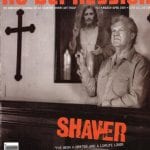Jason Wilber – Truth in fiction
Woody Guthrie once said you can’t write a good song about something you’ve not directly experienced. But while Jason Wilber is neither a conjoined twin nor an ephedrine-addled trucker, he puts us in the freak show, in the fast lane, in the boat by the bank with the trolling motor running.
Wilber has played guitar with country luminaries including John Prine (his steadiest gig) and Iris DeMent, but he also can seize the spotlight. His own songwriting talent was evident on his 1998 debut Lost In Your Hometown and continues with his latest release Behind The Midway (both released on indie label Flat Earth).
On the new disc, Wilber mines the American dream and finds both its white picket fence and dirty underbelly. There are romantic stories of endless summer days and impromptu fishing trips, juxtaposed with tales of the secret lives of carnies and hymns to truckers who age by the mile rather than the year.
“I just wanted to put out a record that was good to me as an artist, to figure out what made a good batch,” says Wilber, quoting Prine in that if he knew where his inspiration came from, “I’d move there.”
The album launches with a mellow number, “Lay Down When You’re Done”, which ambles as leisurely as a Sunday afternoon: “White clouds pass in real slow motion/The rooftops sit and the red birds fly.” The pace quickens with “Indian Summer”, whose 45 mph tempo makes it the perfect driving tune (perhaps destined to join Nick Drake’s “Pink Moon” in the realm of car-commercial music). That in turn segues to the frantic, rockabillyish “Goin’ Fishin'”, with its hook-line-and-sinker wordplay: “I got a green rattle trap and a yellow sparkle tail/Good golly, that tad polly she never does fail/Shake in her cake, throw a hula on your popper/Brother you got a date, well you don’t have to drop her.”
Balancing against such buoyant numbers are the lovelorn closing track “I Can’t See You Anymore” and the plaintive truckers’ anthem “Over the Road”: “I woke from a fitful sleep where wheels painted this picture all around me/In a twelve dollar motel on a pillow full of someone else’s dreams.” But the album’s true standout is “The Ballad Of Amazing Grace And Sideshow Dan”, a half-sung, half-narrated tune whose characters include Flying Paul the Cannonball, Snakeman Johnny Hiss and Mysterio the Mentalist. Musically, it has a talking-blues-meets-Ringling-Brothers vibe, with the oompah of the tuba, a crisp snare drum roll, and a driving guitar arpeggio that propels the story of a tattooed carnival queen genius.
“Honesty is a big part of songwriting. When I hear a song that speaks to me, I feel like the person who’s singing it believes what they’re singing,” Wilber says. “Something about those songs grabs me. The Lou Reed song ‘Satellite Of Love’, there’s something about that song, the whole kind of satellites gone up to the sky — when you hear that song, you get a really big picture in your head. Getting someone to do that with just a few words and music is a great thing.”
While Wilber uncovers America, he also visits the UK — Scotland on a cover of legendary troubadour Ewan MacColl’s “Dirty Old Town”, and Ireland on a duet with Prine titled “The Galway Waltz”. On the latter, a drunken accordion sways in the background, accentuating the contrast between Wilber’s clear blue voice and Prine’s gravelly brown tones.
Even with two solo records, Wilber doesn’t plan to leave Prine’s band. “I like that role as a color man and I don’t want to stop,” Wilber says. “When you’re a sideman, it’s easy to sit back and enjoy everything as a listener. When you’re in front, you don’t get to sit back and enjoy the performance as much. And working with John allows me to make a living and it affords me the opportunity to make my own artistic statement.”
Wilber recently went into the studio with Prine to record the Townes Van Zandt song “Loretta” for an upcoming tribute album. “I’m a big Townes fan,” Wilber acknowledges. “I can’t think of anybody who reminds me of him. He does so much with such simple tools. It’s like Hemingway — it’s simple, but not easy.”
Performing with Prine has taught Wilber lessons in the music business as well as the art, but most notably, he’s realized the importance of being honest. “You run into people who act in a certain way, who gauge the world and move with it,” Wilber says. “But the main thing about John is I’ve gotten to see who he is in everyday life; he is an artist. The great lesson is really be who you are. There’s no reason to be anything else.”




